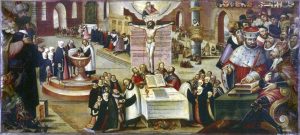“I am tremendously pleased to have lived to this moment when Christ, by his staunch confessors, has publicly been proclaimed in such a great assembly by means of this really most beautiful confession. And [so the word] is fulfilled: ‘I spoke of your testimonies in the presence of kings.’ What follows will [also] be fulfilled: ‘And I was not put to shame.’ For ‘whoever will confess me’ (so he who does not lie states) ‘before men, him I also shall confess before my Father who is in heaven.’*
In early July 1530, Martin Luther wrote these words in a letter to his colleague, Conrad Cordatus, in a report on the recent events at the Diet of Augsburg at that time. Holy Roman Emperor Charles V ordered the Lutheran princes to submit a confession of their beliefs to the imperial meeting. He clearly intended to settle the religious division in the Empire. Since Luther was an outlaw under imperial edict, he remained at Coburg Castle near the southern border of Electoral Saxony. Luther’s most significant colleague, Philip Melanchthon, led the Lutheran theologians and became the primary author of the Augsburg Confession. He wrote and re-worked portions of the document until its official presentation to Emperor Charles V on June 25, 1530.
The individuals who confessed their faith before their emperor were not theologians, but rather secular rulers. The original signers of this document included Elector John of Saxony (known as the “the Steadfast”) and his son John Frederick (later called “the Magnanimous”), Philip of Hesse, George, margrave of Brandenburg, Duke Francis of Lüneburg, Wolfgang of Anhalt, and the leaders of Nuremberg and Reutlingen. These princes and civic magistrates risked their wealth, power, and lives by signing this document. Why were these princes and civic magistrates the primary confessors that day?
This was primarily a political event to reconcile the division within the Holy Roman Empire of the German Nation. No one in the sixteenth century, except some Anabaptists, believed that princes and city councils should not have authority to govern religious practice in their realms. In fact, in 1520 Martin Luther had called upon the German princes to initiate reform within the Church as laymen if the bishops would not do so. Both Catholic and Lutheran princes had implemented ecclesiastical reforms in their territories.
Neither Luther nor any of his theological colleagues saw this as wrong or unusual. They advised rulers on religious matters and exhorted them to restrict the public teaching of false doctrine. Christian rulers called pastors for congregations and appointed theologians to universities. Luther approved all of these actions. Simply put, Luther and these rulers saw it as their duty to uphold proper Christian public practice in their territories. For this reason, they had defied the emperor’s and the pope’s exhortations to stop their reforming activities.
*To Conrad Cordatus, Luther’s Works, vol. 49, p. 354.

